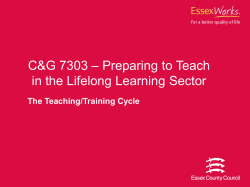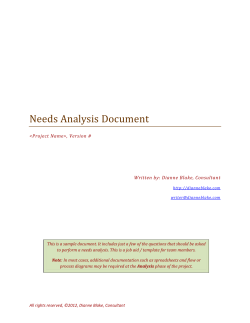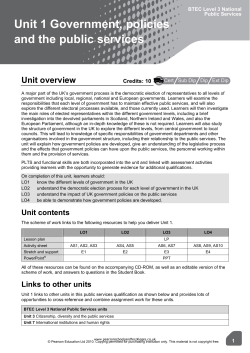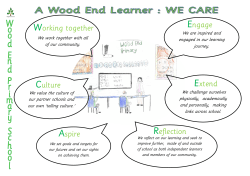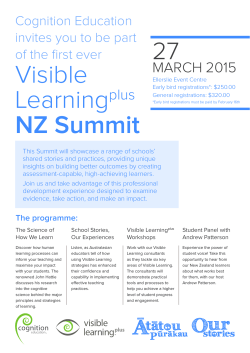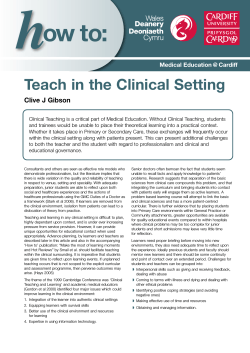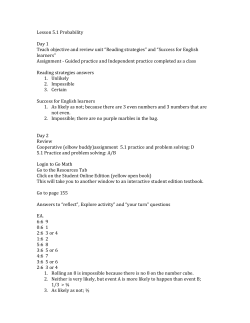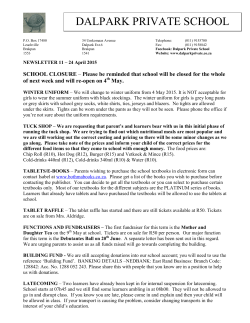
Unit 6: What is the weather doing? Lesson plan for - E
GRADE 4 Unit 6: What is the weather doing? Lesson plan for Term 2 Weeks 1 and 2 and Memos Name of Unit: What is Time: 2 weeks (12 hours) the weather doing? Grade 4: Term 2: Subject: English Home Language Week 1 and 2 Summary of the unit This two-week unit is all about the weather and how it affects our daily lives. We’ll take a look at current weather reports and how they describe the weather. In this unit the students read information text with visuals such as charts, tables and maps. They listen to weather reports and participate in discussions, as well as identify features weather reports. They write their own information text about weather using the writing process of planning, drafting, editing, proofreading and publishing. The language structures and conventions undertaken are adjectives, degrees of comparison, simple past tense and future tense. Curriculum reference Curriculum Standards (CAPS) Grade 4 English Home Language Term 2 Weeks 1 and 2 Skill CAPS requirements Activities Listening & Discuss weather–related What is the weather doing? Speaking questions. Listen to a weather report. (2 hours) Identifies features of weather reports: register and the nature of language used. Reading & Viewing (5 hours 30 minutes) Read text and answer questions. Writing Writes information text e.g. weather chart Write a weather report for your area and present it as an oral to your group. Word level work: Adjectives; degrees of comparison. Weather adjectives; Description of a tornado; Comparison of adjectives. (4 hours) Language Structure & Conventions (30 mins plus integrated time with other skills Read a weather report from a television station How much do you know about weather words? Caught in a hurricane. Read weather vocabulary words and match them to their meanings. Reads information texts with visuals. Note: Reading from Class Reader and Graded Reader activities are not included in this lesson plan. Past and future tense. Sentence level work: Simple past tense, future tense. © e-classroom 2015 www.e-classroom.co.za • Teaching Kids About Weather: Fronts, Clouds, Meteorology http://goo.gl/ERYAJ7 • Weather ideas on Pinterest http://goo.gl/aDL2w7 • BBC SchoolNews Report: weather resources http://goo.gl/ubDucz • Weather Whizz kids http://www.weatherwizkids.com/ 2. Read through the activities in this unit and familiarise yourself with them and what resources they require so that you can be totally prepared before the Unit begins. 3. Start collecting resources such as weather reports in newspapers, weather maps, links to weather reports etc. Refer to the resources section below. 4. Identify some of the necessary vocabulary for this weather unit and write the words onto wordlists. Constantly revise the vocabulary and ensure that the learners’ understanding of the terminology is consolidated. Try to include two spelling tests over the two week period. 5. Note that this unit does not include any reading activities based on the Graded Readers used by the class or the Grade 4 Home Language Reader used by the class. 6. Note who might need remediation and extension and plan accordingly by finding relevant activities for learners who come to your notice. Resources Learner activities for this unit, newspapers, weather reports from newspapers, weather maps, links to weather reports, dictionaries, Internet resources on weather, images of weather conditions, a recording of a television weather report that includes a weather chart. Assessment Informal Assessment Assessment in Unit 6 is Informal Baseline Assessment where the educator keeps a record of the learners’ general progress in acquiring the prescribed listening and speaking, reading, writing and language convention skills. Choose your own form of informal assessment. Note the marking memo guide for the activities under the relevant activities for each skill. The rating scale below could be used. Formal Assessment Use the following scale for recording and reporting assessment in the Intermediate Phase. There is no formal assessment in this unit. Rating code Description of competence 7 Outstanding achievement 6 Meritorious achievement 5 Substantial achievement 4 Adequate achievement 3 Moderate achievement 2 Elementary achievement 1 Not achieved Learning Activities and how to teach them Listening and Speaking Activity: What is the weather doing? Listening and Speaking: Identifies features of weather reports: register and the nature of language used. © e-classroom 2015 www.e-classroom.co.za GRADE 4 Educator preparation for the whole unit before starting 1. Look through resources such as books and online resources on weather reports before you start this lesson so as to familiarise yourself with content for the unit. You will find useful information on the following sites: Reading Activity: Read a weather report from a television station Reading and viewing: Reads information texts with visuals. Preparation and resources This text consists of excerpts from a March 9th 2015 weather forecast given by Candice McKechnie on an ENCA video broadcast shown on YouTube. (http://goo.gl/F3RENZ) • Tell the class about unusual weather occurrences such as thunderstorms and hurricanes. There is a site called Planetpals that has some information about strange weather phenomena and unusual natural occurrences http://www.planetpals.com/weather_phenomena.html. • Look up the YouTube clip of the weather report in the text to play to the learners after the reading activity (http://goo.gl/F3RENZ). • An interesting YouTube video that the learners might be interested in viewing is where BBC Weather presenter Chris Fawkes takes us behind-the-scenes for a glimpse inside a studio in the BBC’s Weather Centre. Find the link at http://www.bbc.co.uk/schoolreport/25430933 Pre-reading Start off by talking about the picture in the reading text and predicting what the text is going to be about. Let the learners quietly read the text independently and try to work out what it is about. Ask them to note the words they are unsure about. After a while, place the learners in pairs to discuss the text they have just read. Let them talk about the words that they did not understand. Read the text Allow the learners to read the text in pairs and go through the questions orally with a friend. Then allow learners time to answer the questions on their own in their workbooks. Answers 1. It helps you prepare for any upcoming weather. 2. Those who are participating in the Argus race taking place in the Cape peninsula would be interested in this forecast. 3. This forecast is for the whole country in a general way focusing on the Western Cape because of the Argus race. 4. He or she will be using a big screen and some type of interactive screen that displays a weather map. 5. We need to know both extremes of the weather to be adequately prepared. 6. a) This means that the cold air is spreading from one area to another. b) These will be thunderstorms in various different places. © e-classroom 2015 www.e-classroom.co.za GRADE 4 This is a whole class discussion introducing the theme of weather. In the opening activity the learners take a look at the weather pictures and talk about them. Discuss weather reports - do they ever listen to them? When and where? What do the learners remember about weather reports? Discuss weather vocabulary and ask the learners why they think it’s important to know what the weather is going to do. GRADE 4 c) The speed of the wind will get more severe. d) The weather that day will be extremely hot. Assessment (Informal Baseline Assessment) Learners’ answers should be assessed to note their comprehension of the text read. The question answers can be discussed orally and can be self-assessed. Keep an observation journal of the learners’ progress in reading. Reading Activity: How much do you know about weather words? Reading and viewing: Uses dictionary to look up meaning of new vocabulary. This is a vocabulary lesson where the learners use their dictionaries and find the meaning of weather words. Answers Column A anemometer barometer Celsius cloud coverage drizzle fronts hygrometer intermittent rain meteorologist overcast precipitation rain gauge temperature thermometer windsock wind speed Column B Measures wind speed Measures pressure of the atmosphere A temperature scale that tells us how hot or cold something is The fraction of the sky obscured by clouds when observed from a particular location Light rain falling in very fine drops. A boundary separating two masses of air of different densities An instrument for measuring the humidity of the air or a gas Stopping and starting over a period of time A weather forecaster. Clouds covering a large part of the sky Rain, snow, sleet, or hail that falls to the ground Measures the amount of liquid precipitation over a period of time The degree or intensity of heat present in a substance or object A temperature scale Finds the wind’s direction Is the measure motion of the air Listening and speaking Activity: Listen to a weather report Listening and speaking: Identifies features of weather reports: register and the nature of language used. • The learners listen to a weather report. You can find one to play or read to the learners, or they can listen to one called “Weather Update: January 21 Evening” from the television station ENCA at this YouTube link: http://goo.gl/0V4BC5 • Before listening, have a discussion about the type of information one can expect to hear in a weather report. Also discuss where one can fnd weather reports to listen to or view. You can find them in many places - newspapers, radio stations, television stations and also on the Internet. • After listening to a weather report, place the learners in groups and let them discuss the questions. © e-classroom 2015 www.e-classroom.co.za GRADE 4 Suggested answers 1. What did you like in this forecast and what didn’t you like? What do you like and not like about the presenter? Learners own answers. 2. Did the forecast hold your attention? Learners own answers. 4. What was the main message that came across? This would usually be something to do with the weather in general – whether it is to be a cold or a hot day. 5. Is there any prior knowledge you need to have before you listen to a weather report? You would need to know some vocabulary words and possibly have an idea of where the various towns and cities are located. 6. At what speed does the forecaster convey the message? Learners own answers. 7. Did you notice any categories in the forecast? Usually the categories are: enhanced satellite (approaching weather fronts, type of weather generally i.e. rain or fine weather,) futurecast (what to expect tomorrow) rainfall probability, temperatures, windstream, minimum and maximum temperatures. 8. How do they emphasise their points- verbally and physically? They use facial and hand gestures and different voice expressions and movements. 9. If you gave a weather forecast what tips would you take from this report? Learners own answers. Assessment (Informal Baseline Assessment) Learners’ answers should be assessed to note their comprehension of the text listened to. The question answers can be discussed orally and can be self-assessed. Language Activity: 1. Weather adjectives Language structures and conventions: adjectives Have a discussion with the class about adjectives. An adjective is a word that describes, identifies or further defines a noun or a pronoun. Let the learners give examples of adjectives. They then complete the weather nouns by thinking of two suitable adjectives for each word. © e-classroom 2015 www.e-classroom.co.za GRADE 4 Answers Learners own answers (These are just suggestions). Noun Adjective 1 Adjective 2 clouds white fluffy rain gentle refreshing snow blinding dazzling wind fierce icy breeze cool energising temperature freezing cold weather pleasant lovely showers welcome intermittent thunder loud clapping lightning flashing blinding Language Activity: 2. The tornado Language structures and conventions: adjectives Before reading this passage let the learners discuss the picture of a tornado and talk about tornadoes. The learners reads this description of a tornado with a partner. They rewrite the passage adding adjectives to the underlined nouns to make the passage more interesting. Answers Learners own answers (These are just suggestions) One hot day I was playing a fun game of soccer with my class friends. I was the goal keeper. From where I stood in the net, bored and sweating, I had a clear view of black thunderclouds swelling on the distant horizon. The longer the game went on, the darker the cloudy sky became. Dangerous thunderstorms can blow in quickly on summer days in our part of the world, but even so, I was surprised at how quickly the first rain drops fell. By half-time it was pouring, with flashes of dazzling lightning getting closer and closer so, we stopped the game. Suddenly we saw a black funnel forming at the bottom of the heavy clouds. Before we knew it, a revolving tornado was spinning towards the soccer field. All the horrified parents grabbed their terrified kids and ran in different directions. My family’s red car was several fields away and there was no shelter nearby and no time to think! We ran to the nearest dirty ditch and climbed in even though it was filled with stale water and there was lightning flashing. The raging tornado was now followed by another two and they headed steadily towards us. We ran for another ditch. We kept doing this so that we could escape from the advancing tornado. As we watched the strong tornado each time, we saw assorted debris flying from the base of the tornado. Terrified, we ran from ditch to ditch three times, planning our routes and sprinting through the howling wind. Suddenly, the furious tornado shrank and became wisps of dark cloud. The driving rain stopped and the storm clouds separated. The bright sun came out and dried our drenched clothes as we stumbled to the untouched car, cold and tired, but happy to be alive and safe. Language Activity: 3. Comparison of adjectives © e-classroom 2015 www.e-classroom.co.za Adjectives can compare two nouns. There are two states of comparison which usually end in –er and -est. Some adjectives use more and most. Others change altogether. After revising this with the learners let them rewrite these comparative weather sentences using the correct form of the adjective in brackets. Answers 1. The second tornado was (bigger) than the first but the third tornado was the (biggest). 2. Today is a hot day, but yesterday was (hotter) and I think tomorrow will be the (hottest) day this week. 3. When I saw the tornados I felt fearful. My little brother was (more fearful) and my baby sister was (the most fearful). 4. Fish Hoek is (windier) than Simonstown, but East London is the (windiest) of all. 5. This week we experienced the (wettest) day we have had this month. Assessment (Informal Baseline Assessment) These exercises are to reinforce the learners’ understanding of language. They can be marked orally and can be self-assessed. Reading Activity: Caught in a hurricane Reading and viewing: Reads information texts with visuals. Preparation and resources Collet pictures and resources about devastating hurricanes around the world. National Geographic has a website on hurricanes with some useful images at this link: http://environment. nationalgeographic.com/environment/natural-disasters/hurricane-profile/ Pre-reading Start off by talking about the picture in the reading text and predicting what the text is going to be about. Let the learners work with a friend and talk about a terrible storm they have experienced or read about. After that the learners read the text independently and note the words they are unsure about. After a while, place the learners back in their pairs to discuss the text they have just read. Let them talk about the words that they did not understand and look them up in their dictionaries. Read the text Allow the learners to re-read the text in pairs and go through the questions orally with their partner. Then allow learners time to answer the same questions on their own in their workbooks. Suggested answers 1. Do you think Mandy and her family were terrified during the hurricane? (2) They had heard on the radio that it was a Category 5 hurricane that was forming and they knew that they would have to just hope for the best. 2. What is the main story about? (2) The main idea is to let you experience the frightening hurricane through Mary’s eyes. © e-classroom 2015 www.e-classroom.co.za GRADE 4 Language structures and conventions: adjectives, degrees of comparison GRADE 4 3. Can you explain what a hurricane is in your own words? (2) Learners own answer. 4. Write down five words that you are not familiar with from the text and look up the meanings in your dictionary. (5) Learners own answer. 5. Compare the conditions of the hurricane to the normal weather conditions before the hurricane had arrived. (4) It was a beautiful summer morning before the hurricane arrived, but in the early afternoon it became very dark. Soon the rain beat down on the roof, and the wind howled as it ripped up anything in its path. 6. Write a short summary of the story in the correct sequence using words such as, first, then, next, after that, soon, and finally. Learners own answers (10) (Total = 25 marks) Assessment (Informal Baseline Assessment) Learners’ answers should be assessed to note their comprehension of the text read. The question answers can be discussed orally and can be self-assessed. Keep an observation journal of the learners’ progress in reading. Writing Activity: Write a weather report for your area and present it as an oral to your group Writing: Writes information text e.g. weather chart. Preparation In this activity, the learners will write a weather report, create a map to go with it and present their weather forecast to a group. This type of report has its own format which is precise, to the point and delivers facts and predictions using weather vocabulary. The learners will use the writing process which consists of planning / pre-writing, drafting, revising, editing, proofreading, and presenting. • Items needed for this activity are: a blank map South Africa, coloured pencils, markers, crayons, an atlas, a weather chart example from a newspaper, and writing paper, piles of newspapers for the weather maps, examples of weather reports being presented on YouTube or recording from television • Look at examples of weather maps and explain to the students that they will be creating their own • Read through the instructions with the students making sure they understand each part as well as the vocabulary used, and then place them in pairs for the activity • Discuss the three stages in depth namely the writing, the drawing and the presenting Writing and drawing In this part of the activity, the learners plan and draft their report and their map. Review these with them in their pairs and allow them to edit. Presenting Make sure the learners have discussed and practised gestures and styles used by presenters of weather reports. Assessment (Informal Baseline Assessment) The learners work can be taken in and individually assessed. An assessment rubric is provided below. Show © e-classroom 2015 www.e-classroom.co.za GRADE 4 the learners this rubric before starting the activity. Rubric Weather map Main cities labelled correctly on the demarcated provinces. Weather symbols correctly drawn and placed. Minimum and maximum temperatures correctly placed. Weather report written Words such as precipitations, low pressure, high pressure, showers, script conditions – fine and dry, chances of rain, rainfall probability, windstream, minimum and maximum. temperatures, extended forecast to be used. All information neatly presented. Presentation of report Creatively presented using hand gestures, controlled movement, eye contact and appropriate voice and facial gestures. TOTAL 15 15 15 15 15 25 100 Language Activity: Past and future tense Language structures and conventions: simple past tense, future tense. In this activity the learners will be working on their understanding of verbs and how they are used in the simple past and the present tenses. Answers: 1. Change sentences from the present tense to the simple past tense - answers. a) The birds flew away when a hurricane started. b) The forecaster took us through the weather details for the week ahead. c) We saw sunshine and blue skies overhead. d) The persistent rain continued across the country. e) Monday started on a mostly dry and sunny note. 2. Change the same sentences from the present tense to the future tense a) The birds will fly away when a hurricane starts. b) The forecaster will take us through the weather details for the week ahead. c) We will see sunshine and blue skies overhead. d) The persistent rain will continue across the country. e) Monday will start on a mostly dry and sunny note. 3. Rewrite the forecast changing the future tense to the past tense A weak cold front pushed across the country on Sunday. The East Coast region started with very mild, sunny spells, but it turned generally cloudy with light rain or drizzle moving through during the afternoon. The heavy rain across the West Coast cleared. Temperatures started to warm up in the northern parts of the country but it turned colder in the southern regions. Assessment (Informal Baseline Assessment) These exercises are to reinforce the learners’understanding of past and future tense. They can be marked orally and can be self-assessed. Writing Activity: Writes information text Designs appropriate visuals, e.g. charts/tables/maps. 1. Write a paragraph about a weather map (10) © e-classroom 2015 www.e-classroom.co.za 2. Create your own weather symbols (10) The learners create their own symbols for sunny, rainy, wind direction and speed, maximum and minimum temperatures, cloudy, partly cloudy, thunderstorms and strong winds. 3. Create your own weather map (20) The learners use their own weather symbols to form a key and create their own weather map for five cities on the provided map. They explain their weather map to a partner. (Total = 40 marks) Assessment (Informal Baseline Assessment) The learners work can be taken in and individually assessed for a comment rather than a mark allocation. Revision This last page provides extra activities to consolidate what the learners have learned in this unit. 1. Write a short weather forecast about today’s weather in your town. This uses the learners own answers which should mention the weather, the temperature, the wind, rain possibilities, the sky and cloud cover etc. (20 marks) 2. Find and replace the adjectives in the sentences. Learners own examples. Answers could be: a) She was wearing a beautiful dress. b) It was a freezing day and everybody was shivering. c) The blazing sun beat down on the scorched land. d) There are huge fires raging in the mountains. (5 marks) 3. Read this forecast and rewrite it in the past tense. Explain that sometimes not only the verb changes to the past tense, but other words also undergo change to fit in with the main ideas of the text. Suggested answers with main changes underlined. Good morning. The heatwave that slowed everybody down last weekend showed no signs of letting up later in the week. It got worse! Our meteorologists predicted that yesterday’s temperature would climb to as high as 40 degrees Celsius by the late afternoon. Only an hour after sunrise, the temperature at the airport was already 29 degrees. However, there was no humidity in the air, so it felt quite comfortable out there. If you had no air conditioning at home, you might have decided to set up a tent in your back garden last night. There was also no rain today. (12 marks + 3 marks for generally good understanding of past tense = 15 marks) 4. Use the comparative adjectives in sentences that highlight the comparisons Learners own answers (10 marks) (Total = 50 marks) Assessment (Informal Baseline Assessment) The learners work can be taken in and individually assessed for a mark allocation. This mark out of 50 will be a guide to their general progress in this unit. Include a spelling test of your own design with this revision section. Remediation for this unit During the course of the unit, assess the progress of the learners informally and make a note of any © e-classroom 2015 www.e-classroom.co.za GRADE 4 Go through various weather symbols used in newspaper and television weather reports. Revise future tenses and the use of the word ‘will’. Most of the answers in this section will be the learners own choice. Enrichment for this unit During the course of the unit, assess the progress of the learners informally and make a note of any learners who appear to be well-ahead and who may require additional activities. Make a list of useful, interesting ideas from the Internet and create activities around them. © e-classroom 2015 www.e-classroom.co.za GRADE 4 learners who appear to be struggling with the concepts. Create your own additional resources to help them consolidate their understanding.
© Copyright 2025
